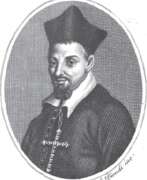Historians 15th century
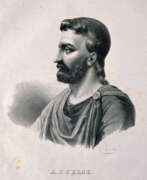

Cornelius Gerardi Aurelius, also called Goudanus, was a Dutch humanist scholar, writer, and historian.
Aurelius was a permanent canon (monk) of the Augustinian monastic order and is one of the first humanists of the Netherlands in the 16th century. He wrote poetry, historiography, hagiography, political and theological works. Aurelius also corresponded with many of the famous men of his day, especially Erasmus.
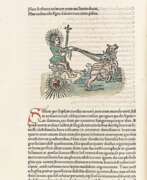

Coriolanus Cepio, or Coriolanus Cepico (Latin: Coriolanus Ceppico, Coriolanus Cepio) was a Venetian humanist nobleman of Croatian origin, historian, and military officer.
In Venice and Padua he studied humanities, navigation and military strategy, then worked as an official in his native Trogir. During the war of the Republic of Venice with Turkey, which lasted four years (1470-1474), Cepio participated in this expedition as commander of the Trogir galley. In Petri Mocenici imperatoris gestorium libri III (Venice, 1477) he described the military expedition and his experiences therein. Cepio describes in detail the military operations in the Levant, near the Ionian Islands, in the Peloponnesus and the Balkans, and in Asia Minor. He is especially interested in the conquest of Izmir, the attempts to set fire to the Gallipoli arsenal and the siege of Shkoder, the capture of Smyrna, the Venetian protectorate of Cyprus, and Scutari.
He covers the Venetian victories at Mochenigo very carefully. As a humanist, Cepio noticed everything that pertained to antiquity and ancient monuments. This book is one of the oldest printed works by Croatian authors.
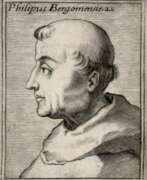

Jacopo Filippo di Bergamo, or Giacomo Filippo Forèsti (Latin: Iacobus Philippus Bergomensis) was an Italian Augustinian monk, theologian and chronicler.
Jacopo di Bergamo was born into a noble family, received his ecclesiastical education at the local monastery, and early showed a penchant for literary work. After traveling in Europe, he took the tonsure and was abbot of monasteries, engaged in their improvement.
He is known as the author of a number of significant early printed works, a chronicler and biblical scholar. His Supplementum chronicarum (1483) is a universal chronicle that survived many subsequent editions. And De claris mulieribus, published in 1497, contains the first account of the voyage of the discoverer Columbus.
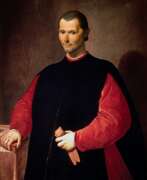

Niccolò di Bernardo Machiavelli was an Italian philosopher, politician and diplomat, historian and Renaissance writer.
As a young man, Niccolò Machiavelli faced financial difficulties due to his father's debts, but had access to a rich library. Machiavelli's early life and career began during a period of political upheaval in Italy. After the expulsion of the Medici family in 1494, for 14 years Niccolo Machiavelli served as a diplomat to the Florentine Republic. During this service, he gained a reputation as a cunning and unconventional thinker. However, when the Medici returned to power in 1512, Machiavelli was dismissed, imprisoned, and temporarily removed from political life.
During this period Machiavelli wrote his famous work The Sovereign, which has become one of the key works in the history of political philosophy. This book epitomizes the Machiavellian approach to politics, where the means justify the end, and where a leader should use any method to consolidate his power. The treatise drew criticism from the Pope, who condemned it for supporting rule through deceit and fear. Nevertheless, The Sovereign is still an important work of political literature, and Machiavelli has come to be called "the father of modern political theory."
Machiavelli lived the rest of his life in a small village near Florence, where he continued his creative endeavors, writing On the Art of War, as well as poems and plays. His literary legacy has become an integral part of the history of political philosophy.
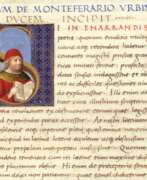

Georgius Merula, also Giorgio Merlani di Negro or Georgius Merula Alexandrinus, was an Italian humanist scholar, philosopher, philologist and historian of the Renaissance.
He held the position of professor and taught in Milan and Venice. But became known for being the first to print the works of Plautus (1472), Scriptores rei rusticae, Cato, Varron, Columella, and Palladius (1472). He also published commentaries on parts of Cicero (especially De finibus), Ausonius, Juvenal, Curtius Rufus, and other classical authors. Merula also labored in historical research and described several significant battles.
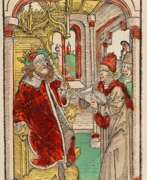

Werner Rolewinck (Latin: Wernerus Rolewinkius) was a German chronicler, historian, and theologian.
Werner Rolewinck was a Cartesian monk. His best known and most important work is Fasciculus temporum, a history from the creation of the world to Pope Sixtus IV. Already during his lifetime this work was republished many times in Latin, French, Dutch, and German. Drawing on major Christian historiographical sources such as Orosius and Eusebius, Fasciculus presents the history of the world in the form of a genealogy, a traditional historiographical structure dating back to late antiquity.
Another famous work by Rolewink is a description of the manners and customs of his homeland entitled De laude veteris Saxsoniæ nunc Westphaliæ dictæ.
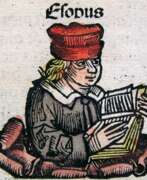

Hartmann Schedel was a German humanist, medical scientist, historian and chronicler.
Schedel was the first to compile a world chronicle, the so-called Visual History of the Earth from the Creation of the World to the 1490s, known as Schedelsche Weltchronik (Schedel's World Chronicle). It was published in 1493 in Nuremberg. About 600 woodcuts for this book were created by the artists and engravers Michael Wolgemuth (1434-1519) and Albrecht Dürer (1471-1528). The illustrations depict biblical scenes, family trees, portraits of famous personalities, and fairy tale or legendary creatures. However, the main ones here were maps of the world, Germany and Central Europe.
Hartmann Schedel was one of the first cartographers to use machine printing. He was also a renowned collector of books, artworks and engravings by old masters.
